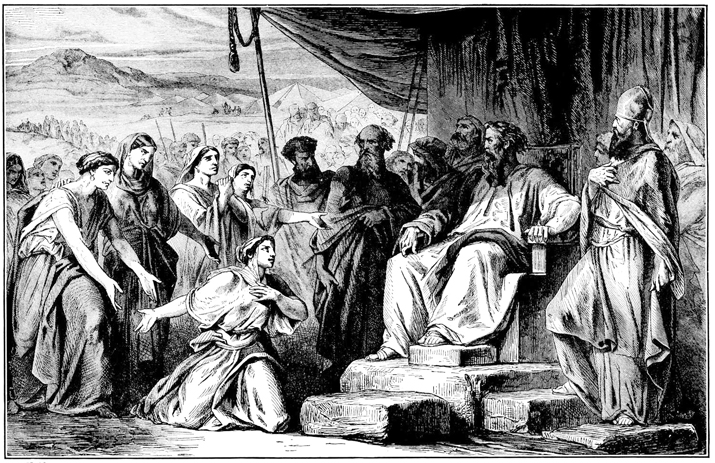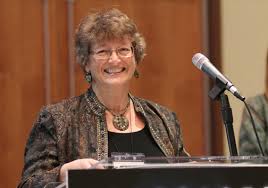More precious than rubies

The Bible: Wisdom Literature
Jewish Family Education with Candace R. Kwiatek
My 5-year-old granddaughter’s favorite birthday present this year was Amy Rosenthal’s Dear Girl, a charming book with an empowering message about being uniquely yourself. Her mother texted: “While reading she looked up and said, ‘This makes my heart happy.’”
It may surprise you to learn that the Bible’s message to and about women is also about empowerment and being uniquely yourself.
Perhaps your impression has been that biblical women are invisible, second-class non-citizens whose only purposes are having children and “keeping the tents.”
Perhaps you’ve learned that biblical women have no unique identities, make no contributions, and offer no wisdom, with only rare exceptions.
Or perhaps you’ve heard about biblical women only as objects and victims or archetypes of sin and evil.
These caricatures may be due more to biblical commentary than to the Bible itself.

Inevitably influenced by the historical era in which it is written, commentary often reflects contemporaneous interpretations and stereotypes: Hellenist, medieval, feminist.
On occasion it’s deliberately crafted to reinforce a cultural norm, as in the misuse of biblical text to justify slavery. And sometimes commentary relies heavily on previous biblical interpretation without examining the text itself and perhaps finding new insight.
Misunderstandings about biblical women may also arise from limited exposure to actual stories in the text or unfamiliarity with their historical context.
But the Hebrew Bible is and has always been revolutionary, asserts biblical and ancient Near East scholar Dr. Nili Samet.
“While it was part of the ancient world, it challenged the prevailing culture and presented new ways to think about the social order,” Samet writes, and that includes the place of women in society.
In truth, women from Eve to Esther have significant roles in the Israelite story as musicians, prophetesses, heroes, judges, warriors, trendsetters, monarchs, midwives, artisans, mediums, and teachers as well as mothers and wives.
They engage in medicine, business, politics, and espionage. Rarely sinful or evil, biblical women are clever, curious, courageous, creative, competent, clear-sighted, and uniquely spiritual.
Read their stories. “Scripture never discounts the female intellect, downplays the talents and abilities of women, or discourages the right use of women’s spiritual gifts,”concludes Pastor John MacArthur.
Let’s explore a few of the myriad biblical texts that reveal revolutionary and relevant cultural notions about women.
“The Bible’s high view of women is rooted in creation,” notes religion author Lita Cosner.
Not only are women and men equally created in the image of God, but when God evaluates Creation, “In the first and only negative statement He says that it is ‘not good’ for man to be alone,” Cosner continues.
Even God isn’t enough. Man needs a helpmate, a partner-helper, a helper-against, one who is opposite, corresponding to, or in front of him.
God creates woman. Not a servant, but a partner with man — equals — who both challenge and complete each other.
After birthing Cain, Eve announces she has “created a man with the Lord’s help.” The same Hebrew word for “create” is used by King Malchizedek to acknowledge the creative power of God, Bible scholar Carol Meyers notes.
From then on, biblical women are said to “bear children,” but Eve set the benchmark. “Creating a man ‘with’ God puts female creative power alongside that of God,” Myers writes.
The tender-eyed, unloved matriarch Leah, married off through trickery, names all seven of her children, spotlighting a little-known statistic.
According to a study by ancient history scholar Edward Bridge, “biblical women predominantly name (the) children.”
It’s a powerful legacy, Bridge notes. “The names of 10 tribes come from the mother,” including Judah from whom the Jewish people arise.
The Fifth Commandment obligates honor and reverence toward both parents. In Exodus, the command is to honor your father and your mother, while in Leviticus, it is to revere your mother and your father.
It’s a “reversal intended to show both parents are equally entitled to these behaviors,” explains Tracey Rich, creator of jewfaq.org.
There’s no need for Myers-Briggs Type Indicator personality tests to conclude that biblical women excel in interpersonal wisdom.
Just a few examples suffice. Midwives Shifra and Puah use Pharaoh’s medical and cultural ignorance to explain why Israelite boys are still being born.
The daughters of Zelophehad present inheritance facts, while Tamar uses physical evidence to prove her innocence to all-male courts.
To reveal Haman’s plot, Esther appeals to the party-loving Ahashverus and pride-filled Haman with noble feasts. From lowly to lofty, biblical women are notably people-smart.
In Proverbs, a young man is instructed, “Blessed is the man who finds wisdom…Her value in trade is better than silver.”
Wisdom has been the quest of many civilizations since antiquity.
Proverbs also suggests that a virtuous woman is to be similarly treasured: “A wife of noble character who can find? She is worth far more than rubies.” That a righteous woman is revered at the same level as wisdom is high praise indeed.
Although limited in number, biblical texts about women reflect individuality, empowerment, contribution, and honor.
If the Bible elevates women alongside wisdom as valued treasures, perhaps we ought to pick it up for another look.
Literature to share
A Stone for Sascha by Aaron Becker. This achingly beautiful wordless illustrated book by the award-winning author-artist of Journey is an inspiration for imagination. When a young girl’s beloved pet dies, she embarks on a fantastical journey across time and space while gathering pebbles at the beach. Ultimately she discovers a profound truth about life and death. A brilliant story for discussion, inspiration, and comfort. Highly recommended for all ages.
Promised Land: A Novel of Israel by Martin Fletcher. If you loved Leon Uris’ Exodus and enjoy the twists and turns of family sagas, this is the novel for you. A former NBC correspondent in Israel, Fletcher is a masterful storyteller who uses inviting descriptions, realistic dialogue, compelling characters, and real events to bring the story of modern Israel’s early years to life. This novel is historical fiction at its best. Highly recommended.
To read the complete November 2018 Dayton Jewish Observer, click here.


